Today marks the second anniversary of one of the worst days of my life. Therefore, I will depart from writing my usual tech content and will do something different.
On the 24th of February 2022, I was in the UK while my wife was in Kyiv. In the early hours of the morning, Russian tanks crossed the border and a heavy bombardment of the civilian infrastructure began across all population centers.
There was no escape from any of these population centers either, as all the roads were completely gridlocked and all fuel stations ran out of fuel. There was also a shortage of food and essential products, as there was panic-buying of all these things and no deliveries were coming.
My wife had to spend several nights in a bomb shelter. She couldn’t sleep, as the bombardment continued 24/7. Russians were already on the outskirts of Kyiv and the future was uncertain.
The worst thing about it all was that there was nothing I could do. The only thing I could do was provide emotional support and pick my wife up from the border once she finally managed to escape.
My wife has managed to escape. Many others weren’t so lucky.
The war is still going on. So, today I am republishing the article that I originally wrote in 2022 shortly after the invasion happened. It’s still as relevant today as it was back then. It’s a long read, but it’s worth it if you want to learn more about what caused the war in Ukraine and how it affects you even if you live in the West.
This article is broadly divided into three parts:
- Why supporting Ukraine and depriving Russia of financial resources is important even if you live in the West and are seemingly unaffected by this war.
- I provide a deep dive into the ideology that made this war possible. I do it as someone intimately familiar with it as a Russian speaker.
- Finally, I outline some easy steps that you can take to help support Ukraine.
How it all began
On the 24th of February 2022, Russian armed forces invaded Ukraine. They started by bombing airports and other parts of civilian and military infrastructure. Then, large columns of Russian ground forces have crossed into Ukraine from Russia and Belarus.
This all has happened without any declaration of war and any reasonable justification. They have simply launched a full-scale invasion of a sovereign and independent European country. The only reason for the invasion was that Ukraine didn’t want to stay in Russia’s sphere of influence. And Russian ruling elites didn’t like it.
After meeting stiff resistance from the Ukrainian armed forces, Russia suffered many losses. And this is when they stopped engaging Ukrainian forces directly. Instead, they have started a genocidal campaign against Ukrainian civilians. Among other things, they have started deliberately shooting at residential buildings.

These residential buildings didn’t just suffer from collateral damage. They were deliberately targeted. But that’s not the worst that Russian occupiers have done. In the cities that they have encircled, they have been deliberately destroying water and power supplies, even resorting to bombing a nuclear power plant, which could have resulted in a major ecological disaster.

They have also been dropping bombs on schools and hospitals, including maternity hospitals.

And the atrocities committed by the Russian soldiers didn’t end there. Countless witness statements say that the occupying soldiers have been deliberately shooting individual civilians, including children.

It would be impossible to list all the atrocities and war crimes committed by occupying Russian forces in Ukraine, as there were way too many of them. Any civilized person would be outraged by them. And if you are, you would probably want to do something to help.
To me, this war became personal. I used to visit Ukraine regularly, as I have friends and family there.

Everyone I knew in Ukraine has suffered due to the war. Every one of them knows somebody who was murdered by the Russian invaders. Some of the places I enjoyed visiting have been reduced to rubble. For example, Irpin, which used to be a pleasant suburb of Kyiv, has been completely destroyed.

This is why I am determined to do everything I can to help Ukraine fight off the might of the Russian war machine. In this article, I will show you some of the easiest ways you can help if you are outraged by these events as much as I am.
But this won’t be a simple “how to” article. To make you understand the whole background of the situation better, I will also provide you with an introduction to the ideology that made the war in Ukraine possible. Yes, this makes the article quite lengthy. But it also helps you to better understand why you should do something against the Russian war machine and not just what you should do.
So let’s begin.
An easy and effective way to help the Ukrainians
There are many ways you can help. You can donate to charities that support Ukrainian armed forces or Ukrainian refugees. You can get to the Ukrainian border to volunteer. Or, if you have some combat experience, you can even go to Ukraine and join the fight against the Russian invaders. But right now, we will talk about something you can do that is way easier than any of these.
The things that we will talk about can be classed as low-tech cyber warfare against the Russian state. The actions that I am about to outline have three purposes:
- Limit the spread of pro-Russian propaganda
- Make the lives of those who spread Russian propaganda uncomfortable, especially of those who live in the West and take advantage of the freedoms and prosperity that they claim to hate
- Strengthen the economic pressure on Russia to reduce its ability to fund the war
All of the actions proposed in this article are 100% legal. All of them are 100% ethical. And none of them require any advanced technical skills.
Russian propaganda and the ideology that it has invented and developed are what made this invasion possible. So is the tax revenue that is paid to the Russian state by many private businesses. This is why we are taking actions that would help to limit Russia’s ability to spread its propaganda and limit its abilities to fund the war. It may not defeat the Russians on the battlefield. But it will slowly starve the invaders of ideological and financial resources, which will eventually make them unable to continue the fighting.
At this point, you may want to ask, why should you even care about it all? If you aren’t directly affected by the war, why is it supposed to be your problem?
And I don’t blame you for prioritizing your personal interests. After all, there are too many atrocities happening in the world for any one person to care about.
But the truth is, even if you live in a developed country far away from these events, this war, and the ideology that made this war possible, still affect you. These events would probably have a direct effect on your quality of life and the safety of the society you live in. Here is why.
Why getting involved is in your interests even if you live in the West
Russia is an authoritarian country that is ruled by a paranoid megalomaniac who believes that everyone else is plotting against him. And this is why Russia has been actively employing a “divide and conquer” strategy against the countries of the civilized world.
The weapon that Russia has been actively using against the Western countries was its well-funded propaganda machine. It’s exactly the same propaganda machine that made the invasion of Ukraine possible. This is why taking action to weaken Putin’s ability to fund propagandists and lobbyists would not only help the Ukrainians but will also improve your own quality of life inside the country that you call your home.
Russia’s ruling elites have been deliberately making Western societies poorer
Russia has been repeatedly found meddling in European and American politics. It’s not even a secret. There is plenty of evidence to support this.
The Russian state has been actively preying on the internal problems of the Western countries and making these problems worse. For example, some relatively minor disagreements between the EU and the UK have resulted in Brexit. It’s hard to say whether Russian involvement has actually caused Brexit. But Russia’s involvement, including financing of various interest groups, cannot be denied.
The result of Brexit has been a substantially decreased quality of life for British people. The prices have gone up and their freedom to travel and work abroad has been diminished. None of the promised benefits of Brexit have materialized. However, the economic ties between Britain and continental Europe have been weakened.
Brexit is not the only thing that has weakened the EU that Russia has been actively involved in. Various other nationalistic movements in the EU have also been found to have been supported by Russia. Some governments of EU member states have been close supporters of Russia until the invasion of Ukraine.
Russia was also found to repeatedly work at weakening NATO by instigating disagreements between its member states. The events in Ukraine have highlighted why NATO is important and why Russia wants it to be weak. So, as well as actively working at making developed Western countries poorer, Russia has also been actively working at making them less secure.
However, instigating conflicts between different states was not the only thing that Russia was doing. It has also been actively working to break up Western societies from the inside. And this has been happening since the Cold War.
Putin’s government has been actively creating disunity in Western societies
If you have been continuously living in Western Europe or the US for the past decade, you may have noticed how polarized society has become. In the past, you could have an easy conversation with someone whose political views are opposite from yours. But these days, it’s all but impossible.
The issue of putting a surgical mask on your face for a couple of minutes while you are shopping, which is just a minor inconvenience at worst, became a contentious political issue. Problems that affect only a tiny proportion of the population became hotly contested political topics taking over news headlines. And there are many people out there who would consider you stupid at best or evil at worst if you happen to vote for politicians that they don’t vote for.
Why did it all happen, you may ask? After all, left-leaning and right-leaning people weren’t that different from each other. Both categories of people would believe in the same core values. They would only disagree on some details and methods of upholding those values. For example, both the conservatives and the liberals would be outraged about the war in Ukraine and would view Russia’s actions as completely unjustified. Both would want the war to end as soon as possible. Both would want the aggressor to be made accountable. But while a typical liberal would be focused on helping people who suffered a typical conservative would focus on bringing those who are responsible to justice.
So why did two groups of people, who broadly shared the same values and only disagreed on the implementation details, suddenly start to hate each other? In part, it can be explained by the echo chambers created by the widespread use of social media. But this rift was also being deliberately and systematically widened by Russia.
During the Cold War, the Soviet Union was actively meddling in American academia. In fact, many of the so-called “woke” professors of today are former students who have been influenced by the communist ideology that was carefully planted in American academia by the Soviet KGB. This is what multiple KGB defectors have admitted.
It’s hard to say whether Russia continues financing and influencing left-leaning political groups as it did during the Soviet times. However, its propaganda actively works at making it look like the extreme ideas of the political far-left and far-right are far more widespread in society than they actually are. This triggers a reaction from people with moderate views and sometimes makes them adopt more extreme views.
The following example from Russia Today, a Russian state-owned propaganda outlet, demonstrates how extreme political ideas are presented as something normal in Western societies:
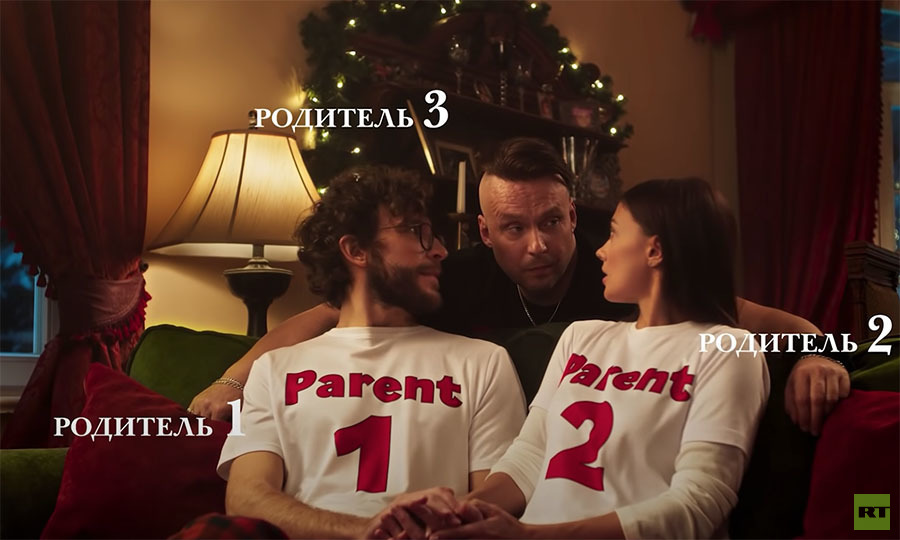
But this is not where Russia’s influence on Western political life stops. Various right-leaning parties in Europe and the US were found to be directly funded by Russia. Sometimes you may even hear European and American conservatives literally regurgitating the standard talking points of Russian propaganda. Knowingly or unknowingly, some Western politicians are being used by Russia as its mouthpieces.
So, doing something to help limit the spread of Russian influence doesn’t only help to deprive Russia’s invasion of Ukraine of its ideological fuel. It will also help to make Western societies more prosperous, more united, and safer.
But before we go through the actions that you may take, it might be worth getting familiar with the ideology that Russian propaganda has created. This will help you to see why what Russia is doing is far more dangerous than what you may have possibly imagined.
There are many similarities between Russia’s invasion of Ukraine in 2022 and the invasion of Poland by Nazi Germany in 1939. You might be surprised, but even the ideologies that made both wars possible are almost identical. You hear it right. The ideology that Putin’s propaganda has created is not very different from Hitler’s Nazism. And as you will see shortly, this is not an exaggeration.
The extremist ideology that made the invasion possible
You may ask what qualifies me to explain what the ideology of Putin’s propaganda machine is. Well, I am not a professional political analyst. But I am intimately familiar with how Russian propaganda works. I was born in Belarus and Russian is my first language. I have access to Russian media in its native language. I have consumed Russian media since I was a kid. And I personally know many Russians, so I have first-hand experience of what their beliefs and values are.
In fact, I’ll have to admit that Russian propaganda is so good that if my life had taken a different turn and I wouldn’t have had an opportunity to obtain a science degree from a good British university, I could have been one of its adherents. A rudimentary understanding of cognitive biases that was taught in my science lectures has given me some understanding of the manipulative techniques that propaganda uses. But not everyone is familiar with cognitive biases and the blind spots of human intellect. The propaganda is designed in such a way that it ensures that even intelligent people often fall victim to it.
Another problem with the ideology of Putin’s Russia is that it doesn’t have a name. This is by design. When an ideology has a name, an intelligent person may realize that they are following someone else’s ideology that may not have been designed with their own best interests in mind. And this is how they may start questioning its correctness. However, when an ideology doesn’t have a name, it’s hard to realize that you are an adherent of an ideology. Its doctrines will just look to you as common sense. It’s just the stuff that all normal people believe in. It’s very hard to leave a cult when you don’t realize that you are in one. And it’s hard to realize that you are in a cult if your cult doesn’t even have a name.
But even though Russia’s ideology doesn’t have an official name, it surely has every other characteristic that is common to any ideology. And once you examine it closely, you will realize that it’s not very different from Nazism. Maybe just a little bit less extreme.
So, before we discuss Putin’s ideology further, we will need to give it a name. Luckily for us, there is already a name that has been given to the most zealous followers of this ideology. In Russian-speaking communities, they are referred to as “vatniks”.
Originally, the Russian word “vatnik” referred to a cheap wool-filled jacket that would be typically worn by people from the very bottom of the socio-economic hierarchy. These people tend to have the most hard-line conservative views and are the most susceptible to propaganda. This is why, in 2011, a meme character was created to make fun of those people.
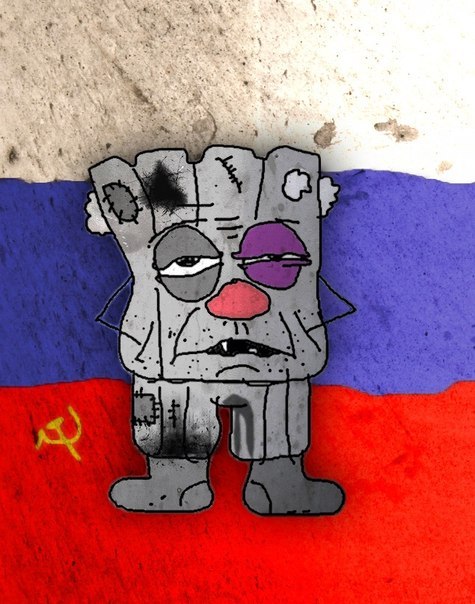
But since the annexation of Crimea by Russia in 2014, the word “vatnik” has been used to describe anyone who unconditionally trusts Putin and believes the Russian state propaganda. So, let’s refer to this ideology as “vatnik ideology” and let’s have a close look at what it consists of.
It goes without saying that not every Russian is a vatnik. Not every Russian actually believes the state propaganda and has the same values as the ones who do. There are many decent people in Russia. But, unfortunately, Russian state propaganda has more than its fair share of “true believers”. And these are the core beliefs that they share almost universally.
Vatniks are members of a militaristic quasi-religious cult
The ideology that the Russian state actively promotes among its citizens is highly militaristic. You may have seen grand military parades in Moscow on the 9th of May, which marks the end of the Great Patriotic War, as the part of World War Two where Russia was involved is referred to. It may be a surprise to you, but this happens to be the most sacred public holiday in Russia.
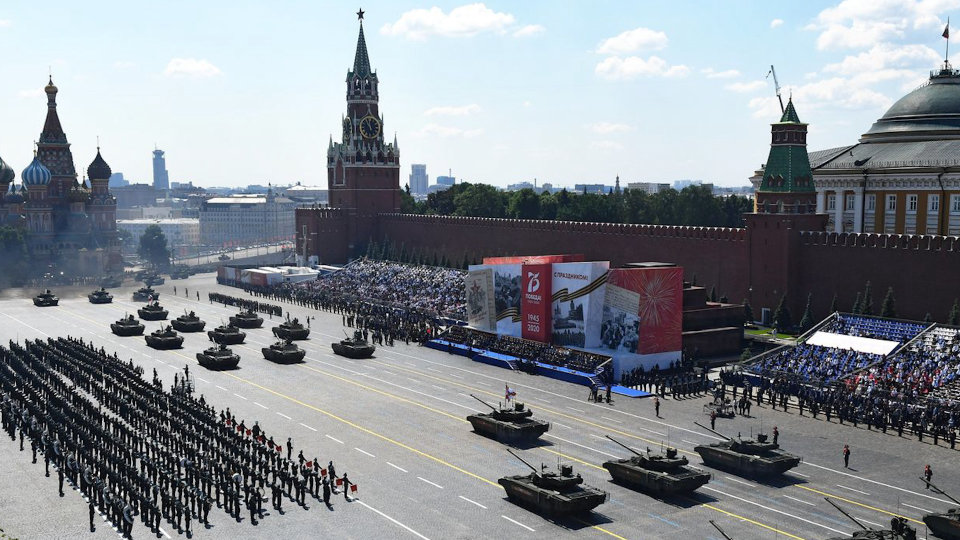
In a way, it’s even more sacred than Christmas or Easter. Not everyone celebrates Christmas or Easter. But participation in the Victory Day celebration is considered by popular social opinion to be absolutely mandatory. Also, nothing will happen to you if you speak badly about religious holidays in Russia. But if you speak badly about Victory Day, you may get into big trouble. You may even be imprisoned.
The indoctrination into this militaristic cult starts from childhood. The version of history that kids are taught in school primarily focuses on military achievements. And school students are taught that the Soviet victory over Nazi Germany in World War Two is the most important historic achievement of Russia that has ever occurred.
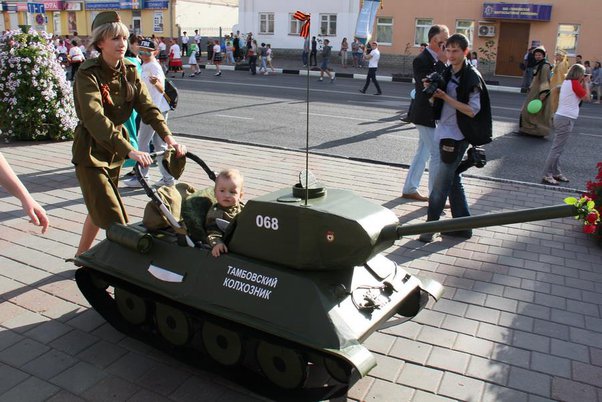
As a result of the education program aimed to indoctrinate kids and the state propaganda aimed at adults, a militaristic national supremacist cult has been created.
Even the Russian Orthodox Church, the state-sponsored denomination of Christianity, actively participates in the creation of this nationwide militaristic cult. Unlike any other Christian denomination, it doesn’t preach peace, forgiveness, and love for your neighbor. Instead, it actively promotes war and calls for the death of the enemies of the state. It’s not uncommon to see the priests blessing weapons of war.
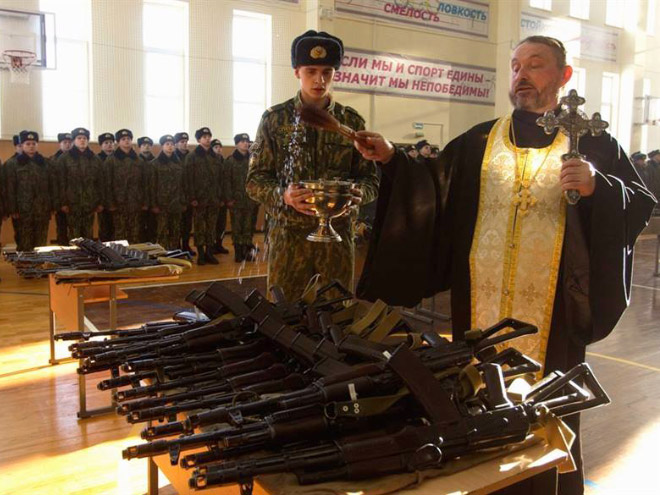
Also, unlike any other Christian denomination, the Russian Orthodox Church doesn’t recognize any other Christian denomination as truly Christian. And this just mimics another core belief that vatniks have that goes hand-in-hand with militarism – the unconditional belief in Russia’s supremacy.
Vatniks believe in absolute Russian supremacy and they see anyone else as inferior
One important thing to note about Putin’s state propaganda is that it didn’t just invent a new ideology. It has built upon the existing cultural beliefs and social norms of Russian society. Many of those were relics of the Soviet past, which itself had a highly propagandized society.
As a kid, I had an opportunity to experience both British and post-Soviet school systems. And one noticeable difference between these school systems is how World War Two was taught.
In Britain, World War Two was taught in its entirety, including the events that preceded it. A thing that was taught in detail was the state of German society after the country’s defeat in World War One. Students were taught how the economic and societal conditions of the time made it possible for a mad populist like Hitler to become the head of state. The main purpose of including this in the curriculum was to inform people about how totalitarian dictatorships are formed and how ordinary citizens are manipulated into giving power to a dictator. This is part of the reason why Western societies are somewhat immune from being turned into an autocracy.
The Russian educational system, which is based on the old Soviet model, covers none of that. This is why Russian society is so vulnerable to populism, propaganda, and strong authoritarianism.
In Russia (and in Belarus), the events that preceded World War Two are barely covered in the history classes in public schools. Even the World War Two itself is not covered in much detail until the point when the Nazi Germany has attacked the Soviet Union. From this point onwards, this is called the Great Patriotic War.
This period of the war is covered in detail, but only the events on the Eastern Front are taught, where the Soviet Union was directly involved. What Russian education specifically focuses on is how Russia suffered in the war and how it managed to eventually win it. The events that were happening elsewhere during World War Two are hardly mentioned at all. And there’s also very little mention of Allied involvement in the war.
Many Russians only happen to know about the D-day landing in Normandy and the events at Pearl Harbor because they have watched some Hollywood movies. I have personally met many Russians who are completely unaware of the Battle of Britain. They genuinely believed that Britain wasn’t affected by World War Two at all.
This is one of many reasons why those Russians who take the state propaganda for granted believe in the national supremacy of Russia over any other country. What else would you believe in if you had been taught that your close ancestors had won a major war against an evil superpower with almost no help from the outside?
But this is not the only reason why vatniks believe in Russian superiority. The Russian educational system never mentions any wars where Russia was the aggressor, of which there were many. So, as well as believing in the competency of the Russian armed forces, vatniks sincerely believe that Russia never gets involved in wars without a good reason. So, whenever there is a war going on, like the one in Ukraine, it’s extremely easy to convince vatniks that the war is fully justified.
Vatniks believe that any country that used to be a part of the Soviet Union must be taken back by Russia
One of the reasons why many people in Russia think it’s absolutely OK for Russia to invade other countries and annex territories is because, for many years, Russian state propaganda has been building the idea of the so-called “historic justice. The core tenet of “historic justice” states that all lands that have ever been occupied by the Soviet Union must, one day, either return to Russia’s sphere of influence or be outright annexed by Russia.
It’s not clear whether Putin believes in this concept ideologically. Most likely, he simply preys on the patriotic feelings of the Russian people to divert their attention from the problems inside Russia itself, of which there are many. It’s a very common thing for autocratic regimes to do.
Another reason why the Russian state is working so hard to make people believe that they should want the former Russian lands to be re-absorbed by Russia is because some of these countries have standards of living way better than those of Russia. Estonia and Lithuania certainly do. And this is bad for those who rule Russia. The fact that Russian people can see that other ex-Soviet countries have managed to do way better than Russia may reduce the popularity of the current Russian leadership. But the best way to prevent those countries from developing is to gain control of them.
Whatever the real reasons for the aggressive promotion of the “historic justice” idea is by the Russian state propaganda, this idea is one of the fundamental reasons why a sizable proportion of Russia’s population supports the war in Ukraine and has previously supported the war in Georgia and the annexation of Crimea. They have been sold the idea that national pride is way more important than their own standards of living.
Vatniks don’t value human rights
An authoritarian state doesn’t value human rights. After all, human rights and people’s awareness that they have rights prevent an authoritarian dictator from holding onto power. This is why Russian state propaganda is doing everything it can to convince people that human rights are actually bad.
And Russian people aren’t difficult to convince, especially those who have experienced the Soviet Union. In the Soviet Union, there was no such thing as private property. Everything you had was given to you by the state. Even your life wasn’t yours. You had to live and work where the state told you. And if you stepped out of line – you were severely punished. Even things like owning your business were often punished by a long prison sentence and sometimes punished by death.
Of course, since then Russia has experienced free market capitalism and it even had a brief experience of democracy. But Russian state propaganda has been actively trying to convince people that human rights are alien to Russia and have actually been designed by the West to make Russian society weaker. For example, the European Court of Human Rights is often portrayed by Russia’s state media as an organization that helps criminals escape justice. Any Western complaints about the mistreatment of the Russian political opposition are presented as attempts by the West to undermine Russian law and order.
This is precisely why Russian forces fighting in Ukraine think nothing of deliberately shooting at people’s houses and civilian infrastructure. And this is why there is a sizable proportion of the population in Russia that doesn’t get shocked when they see the footage from the war. Russian state propaganda has created a low-empathy society. And the empathy is especially low for those who are presented as enemies of Russia.
Vatniks are noticeably racist and xenophobic
The best way to convince people of the necessity of a totalitarian government is to come up with an enemy that only such a government would be able to protect the society against. This is why it’s almost universal for such governments to pick a group of people as the enemy, fueling xenophobia against them.
In Nazi Germany, Jewish people were the enemy, along with Roma and some other ethnic minorities. In Stalin’s Soviet Union, people of certain socio-economic backgrounds were the enemy. Other dictatorships had people of particular political affiliations as the enemy. And the list goes on.
Putin’s Russia is no exception in terms of creating a common enemy. And its playbook is more similar to Hitler’s than to Stalin’s. State propaganda has done a lot to convince people to hate others based on their ethnicity, gender, and sexual orientation.
Firstly, the whole idea of Russian supremacy is built upon the belief that people from other nations are inferior. The more people are different from Russians – the more inferior to Russians they are. This is why Russia is a country of widespread and open racism, especially against people with African, Middle Eastern, or Asian heritage. All of this racism is nothing but a byproduct of the repeated statement of the Russian state propaganda that Russians are special people who are better than anyone else.
There are several high-ranking Russian politicians and oligarchs who had past affiliations with extreme far-right groups. For example, Dmitry Rogozin, a former head of Roscosmos, Russia’s space agency, used to be a leader of a neo-nazi political party. The party even used a swastika as one of its symbols.
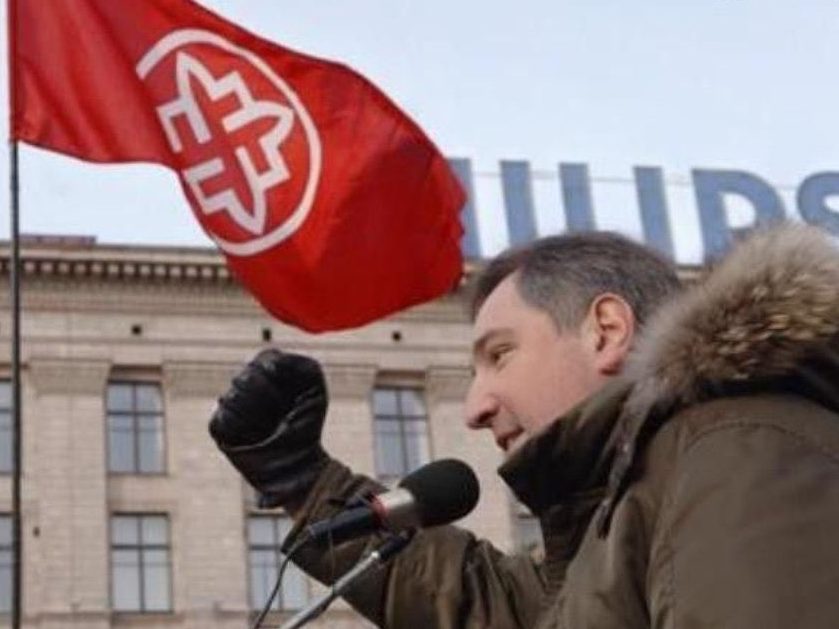
But it’s not only the idea of Russian supremacy that fuels racism among vatniks. Russian state propaganda has also been encouraging racism by presenting ethnic minorities that live in Europe in the worst light possible. This was done primarily to discourage Russian people from wanting to accept European values of diversity and tolerance. But it went much further than that and has resulted in the acceptance of open racism within society.
As someone who knows a lot of Russians and frequently visits Russian web forums, I regularly hear racist statements being made and I frequently see racist posts being put online. Usually, it’s done very casually, as if these things are totally normal to say. In fact, people who post this content genuinely don’t see anything wrong with what they say. Putin’s state propaganda has normalized it all.
As you can imagine, the people who have been encouraged to be xenophobic for many years are fairly easy to convince that any ethnicity or nationality that happens to be antagonistic to the Russian state is bad. This is why Russian armed forces have absolutely no problem deliberately bombing maternity hospitals or launching warheads at civilian bomb shelters where children hide.

Since the war began, Russian state propaganda has indeed been promoting hate against Ukrainians, branding them “Nazis”. And this rhetoric has indeed worked on many Russians. I have been visiting various online forums and speaking to various individuals. And, although many reasonable people are against this war, a noticeable number of Russians are saying that Ukrainians deserve everything that’s coming their way. That includes the bombings of schools, hospitals, and residential areas.
But xenophobia and racism are not the only types of intolerant beliefs that define vatnik ideology. Perhaps these other aspects of vatnik ideology have little to do with the war in Ukraine in particular. But I will still outline them to complete the picture of what kind of person you are dealing with when you are speaking to a Putin supporter.
Vatniks are homophobic and sexist
Russia is a homophobic society. It’s not only a country that bans Gay Pride parades and LGBT literature. In Russia, it’s totally acceptable to make homophobic statements on state TV. However, it’s illegal to talk about any LGBT issues in either a positive or a neutral way on any mass media. Such talks are officially referred to as “illegal gay propaganda”.
And this is not by accident. Russia wasn’t always a homophobic society. For example, in the early 2000s, Tatu, a Russian lesbian duo, was very popular both in Russia and abroad.

This was far from being the only case. The late 1990s and early 2000s were a period when homosexuality was largely tolerated and was even seen as something curious. Many Russian artists of the era were openly gay and nobody cared.
It all changed when the LGBT movement started being singled out as a symbol of Western values that the Russian state so desperately fought against. This is how open homophobia gradually became not only accepted but even encouraged. And the ban on the so-called “gay propaganda” didn’t come about because the state felt genuinely threatened by gay people. It came about because the state desperately needed an enemy for the people to rally against, as Putin’s popularity rating at the time was dwindling.
Because vatniks tend to be ultra-conservative and one of the key motos of vatnik ideology is adherence to the traditions of the past, vatniks are also often noticeably sexist. And when I say “sexist”, I don’t mean “someone who doesn’t agree with all ideas of the latest wave of the feminist movement”. In the context of vatnik ideology, it means “somebody who believes that men are inherently better than women and are allowed to treat women as their property”. For example, domestic violence in Russia has been fully decriminalized. And this was because there was a popular demand for it among vatniks.
So, now you fully understand what ideology made the war in Ukraine possible. Perhaps it’s even worse than you thought before. Perhaps things even started to make more sense and it’s no longer a mystery why a country like Russia could attack a sovereign European country in such a vicious way.
According to Meriam-Webster, the definition of fascism is as follows:
A political philosophy, movement, or regime (such as that of the Fascisti) that exalts nation and often race above the individual and that stands for a centralized autocratic government headed by a dictatorial leader, severe economic and social regimentation, and forcible suppression of opposition. A tendency toward or actual exercise of strong autocratic or dictatorial control
And now you can compare it with the ideology of the Russian state and make your own conclusion.
As I said before, not all Russians adhere to this ideology. Until recently, Russians had unrestricted access to the web. Even now, when internet communication is under strict censorship by the government, many Russians still know how to use VPNs and proxies to obtain alternative information. But this ideology still describes pretty accurately the beliefs of those who do trust the state propaganda.
So now, I will finally tell you what you can do to help in the fight against the war machine that is fueled by this vile ideology.
Necessary preparations before you start taking actions
Before you start taking the action, you need to be aware that you might encounter trolls paid by Russia or true believers in the vatnik ideology. So, it makes sense to get familiar with how to identify such people and what to do when you encounter them.
Don’t argue with any potential Russian trolls
Russia operates many so-called “troll farms”. This is where people are paid to open multiple online accounts, which are then used to spread Russian state propaganda and silence its critics by pretending to be real people on social media and other types of web forums.
How can you tell if someone you are arguing with online is a Russian troll? Well, the truth is, you often can’t. A Russian troll can have a Facebook profile that was created yesterday and has a cartoon character as its profile picture. In this case, it’s an obvious troll profile. Likewise, a supposed “company director” on LinkedIn with a long job history and over 500 connections can also be just a fake profile used by Russian trolls.
There is also another category of Russian trolls – real professionals who use their real profiles online. They just happen to be paid by the Russian state to lobby its interests.
So, because you can’t always tell if you are dealing with a Russian troll, a good rule of thumb would be to assume that anyone who actively and aggressively defends Russia’s actions on social media and/or regurgitates the common talking points of Russian state propaganda is a Russian troll. Unless, of course, you know them personally.
There is no point in arguing with Russian trolls. They are paid to do what they do. They aren’t people who genuinely believe in what they say. So you will just waste your time and energy trying to convince them.
When dealing with potential Russian trolls, just ignore them. If you happen to come across any especially persistent ones, just block them.
Get familiar with tell-tale signs of vatniks on social media
Besides trolls that are paid by the Russian state to spread its propaganda, you may also meet some people online who are true believers of Putin’s ideology. It’s not always possible to easily identify a vatnik, as not all of them talk about their beliefs openly. But for those who do (of whom there are many), one giveaway would be a Russian flag either next to their name or on their profile picture on social media.
I’m not saying that displaying the flag of your country is a bad thing. For example, people all over the world do it during global sporting events, like World Cups and the Olympics. But while this war is going on, displaying the Russian flag on your profile has a very specific meaning. A person who does it is openly expressing their support for the invasion of Ukraine by Russia. This implies that they are also supporting all the actions that the Russian military does in Ukraine, including war crimes.
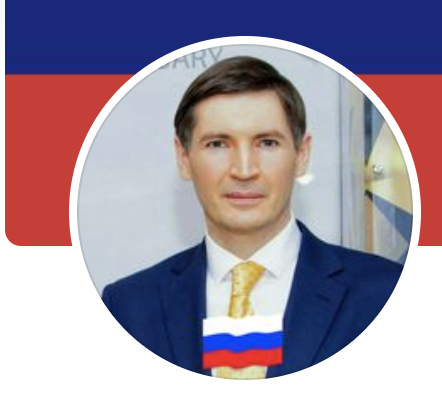
But there are also some even less ambiguous tell-tale signs. Letters V and Z became the symbols of Russia’s invasion of Ukraine because these letters can be frequently seen painted on armored vehicles of the invading Russian armed forces. And these are specific to this particular war.
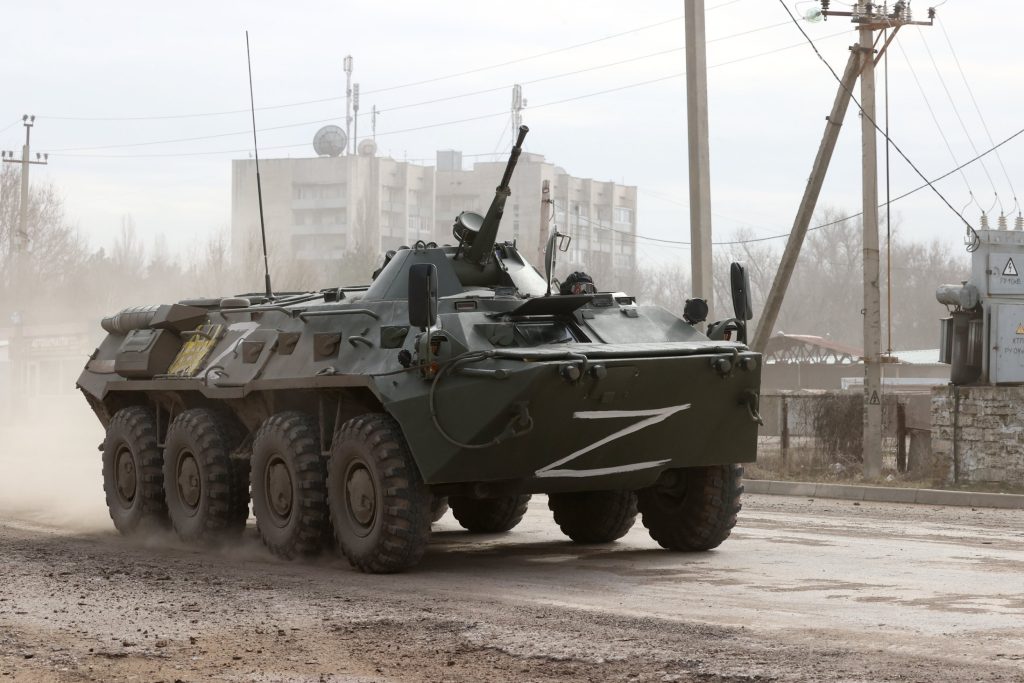
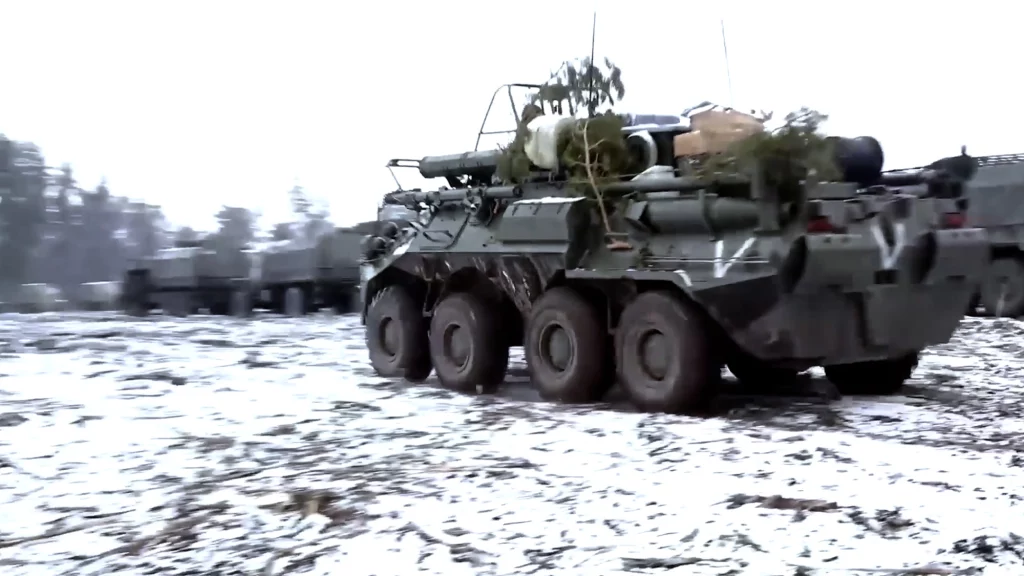
So, if you see either of these letters being displayed on someone’s social media profile, it definitely means that this person supports the invasion. It’s an even more overt sign than displaying the Russian flag.
These letters can often be seen being displayed in a pattern consisting of alternating orange and black stripes. And this is another symbol that vatniks use to display their support of Russian armed forces.

This pattern was traditionally associated with the Russian military and its past victories. But in 2014, it became an explicit anti-Ukrainian symbol. So, when you see anyone putting this pattern on their profile picture, whether arranged in one of the letters described above or just as a stripe, you can be sure that this person is a true believer of the vatnik ideology and that such person hates Ukraine and Ukrainians.
We have previously discussed how intolerant vatnik ideology is. So perhaps seeing somebody displaying any of these symbols will make you think before you establish any relationship with such a person. For example, if you are an employer and you see a candidate for one of your vacancies displaying any of these symbols, you would probably want to think carefully about whether a person with these kinds of beliefs belongs in your organization.
Anyway, this concludes the preparatory steps. Now, I will walk you through the concrete actions you can take to damage Russia’s war machine.
Using technology to defeat evil
The methods described here are so simple that you may even think that they are ineffective. But they are effective. And I will explain why. So let’s begin.
“Cancel” any vatniks or professional Russian propagandists you can find
In this context, the word “cancel” refers to severely limiting their ability to spread their ideology. There are two levels of cancellation you can apply:
- Getting them banned from social media
- Getting their employers, educational institutions, or business partners to terminate any relationships with them
It’s up to you how far you want to go.
Such actions often have a bad reputation, because people often misuse them. When used excessively, it’s referred to as “cancel culture”. And when people gang up against someone on social media merely because this person has expressed some benign political opinion that is different from theirs, it is indeed bad. I wouldn’t condone such behavior.
But when we are talking about canceling vatniks, things are very different. The ideology that they are actively spreading and that they are trying to normalize is truly harmful. It causes real suffering in the real world, which has culminated in the war in Ukraine. It is that rare situation where canceling someone is appropriate and would help save lives.
So, what specifically can you do? Well, as I have already mentioned, the adherents of vatnik ideology tend to be xenophobic and they would think nothing of posting content that is generally considered to be inappropriate in civilized countries. People from Russia who adhere to liberal Western values don’t support the war in Ukraine.
What you can do is report such content to the social media platform for breaking its rules. If their profile gets banned or severely restricted as a result of that, it will limit their ability to spread pro-Russian propaganda.
If you want to go further, you can take screenshots of such posts and send them to the person’s employer, educational institution, or business partner. You can even get other people to do the same, so it won’t be just a single person reporting it.
Sometimes even reporting them expressing their support for the Russian invasion is enough. For example, if the company they work for has officially condemned the invasion (as many companies did) but their employee has a letter Z alongside the Russian flag all over their profile, I don’t think it would be good for the company’s reputation. The company would either force their employee to remove any of this content from their profiles or even terminate the professional relationship with them. Either way, you win. The ability of such a person to spread murderous ideas of Russian supremacism would be limited.
Why this action is effective
This action is effective because, even on your own, you can silence several people who spread pro-Russian propaganda. But its true effectiveness makes itself manifest when many people engage in this process. This way, not only individual vatniks will be silenced, but it will also give the message to other vatniks that the ideology that they follow is unacceptable in the civilized world and that promoting it won’t be tolerated.
Put pressure on international corporations that are still operating in Russia
Many international brands have either left Russia or severely limited their business activities in the country since the war started. Some of this happened purely because of pragmatic reasons. This, for example, has occurred where either Western sanctions or Russian counter-sanctions made it very difficult to continue doing business in the country. However, many companies have limited their activity in Russia purely because they were worried about their reputation. For example, Ikea has closed its stores because Swedish people made it clear that they don’t want the company to support the Russian war machine with its tax money.
And this is where you can play your part too. You can find out which international companies are still operating in Russia and put pressure on them to stop doing their business there. You can write to companies’ representatives. You can write to the official corporate messengers on social media. You can tag top-level executives in your social media posts and tell them of the war crimes that their taxes are supporting while the war in Ukraine is going on.
You can also go one step further and put pressure on those corporations that have pretended to limit their activity in Russia, while actually doing very little. For example, if any company has announced that they are limiting their investments, it means almost nothing. It means that the company is trying to virtue-signal while continuing to support the Russian government with its taxes.
Why this action is effective
It may seem that writing to an international corporation on social media would be ineffective. After all, why should a major global business entity listen to you? And it is partially correct. But this action becomes truly effective once many people start participating in it.
We already saw examples of companies leaving Russia purely because enough people wrote to them. This is why, for example, McDonalds, Coca-Cola, and Pepsi have stopped doing business there. This is also why Nestle, which has previously resisted the calls to leave Russia, has restricted its business activities.
So, this method works, as long as enough people are doing it. And even though your individual contribution may seem insignificant, it is significant. Don’t forget that a mass of people consists of individuals. The more individuals participate – the bigger the mass becomes. And when the mass reaches a certain level – even a major international company will no longer be able to resist the pressure. Your message to the company might even be that straw that broke the camel’s back. It might be the actual trigger for the company to take action.
The less money the Russian state gets from the business – the less it will have to finance its war in Ukraine and its propaganda abroad. And if Russia won’t be able to replenish its resources that are quickly being eaten away by the war – it will have no choice but to eventually pull out.
Boycott all products that originate from Russia
Another source of Russian tax revenue is Russia’s own corporations. So, another way to cut the amount of revenue the Russian state receives is to stop buying products that originate from Russia. And how would you be able to tell if any product originates from Russia? Well, it’s pretty simple. Just have a look at the barcode on its package. If it starts with 46, then the product has been manufactured in Russia. Don’t buy it.
Why this action is effective
You may ask, why would it be effective to boycott the products that have already been manufactured and bought from the Russian wholesalers? Haven’t those paid the taxes to the Russian state already? Well, it’s not that simple.
If as many people as possible are aware of this barcode prefix and enough of them choose to not buy any products that have this prefix, then the demand for Russian products abroad will plummet. This, in turn, will cause the companies abroad to reduce the amount of products they buy from the Russian wholesalers. And that will cause the manufacturing outputs in Russia to be reduced.
The fewer products Russia can sell – the less tax revenue the Russian state will earn. And the less money it will have to support its war machine.
Spread this information as wide as you can
All these actions described here only work when enough people participate in them. This is why it’s important to spread this information as widely as you can. Not only people will know what to do to help Ukraine in its fight against Russia, but they will also know why they should do it.
For example, many people in the US and Europe still believe that Putin is merely a protector of traditional values. But after reading this article, they will realize that things are nowhere near as benign as that. They will understand that Putin is a very insecure man who also happens to be an architect of fascist ideology with a flavor of Russian patriotism.
The misconception that Putin is merely a “conservative” in the Western sense of the word is nothing but a byproduct of Russia’s propaganda in the West. But another byproduct of the same propaganda machine is the highly polarized and divided society in the West. And this is another reason why everyone needs to pull their weight to deprive the Russian state of its resources. If we do it together, we can deprive Russia of both its ability to sow discontent in civilized societies and its ability to fund this specific war.
Wrapping up
For this article, I have deliberately chosen the easiest actions that absolutely anyone can do. But despite their simplicity, they still have proven their effectiveness. Many Russian propaganda channels and profiles on social media were closed after being reported by a high number of people for violating community guidelines. Likewise, many international businesses have severely restricted their activities in Russia after a high enough number of people have voiced their disapproval.
But of course, you don’t have to stop with these basic actions. You can go further in helping Ukraine fight off Russia’s invasion if you want to. You can donate money to the Ukrainian armed forces. You can donate to charities that help Ukrainian refugees. You can become a sponsor to Ukrainian refugees and help some of them move to your country.
People with military experience can join the Ukrainian Foreign Legion to join the fight against Russia’s occupying forces. People have been blocking trucks on the border between Belarus and Poland to prevent businesses from bypassing sanctions imposed on Russia and delivering Western goods to the country. Hacker groups, like Anonymous, have been performing direct cyber attacks on Russia’s governmental and military infrastructure.
There are many things you can do to help Ukraine. And together, we can win this war.
Слава Україні!
